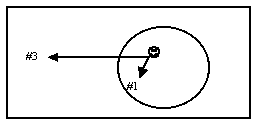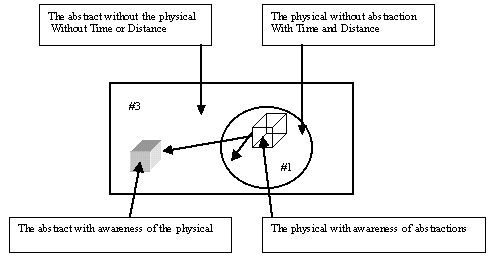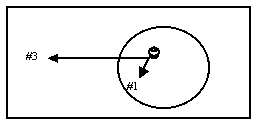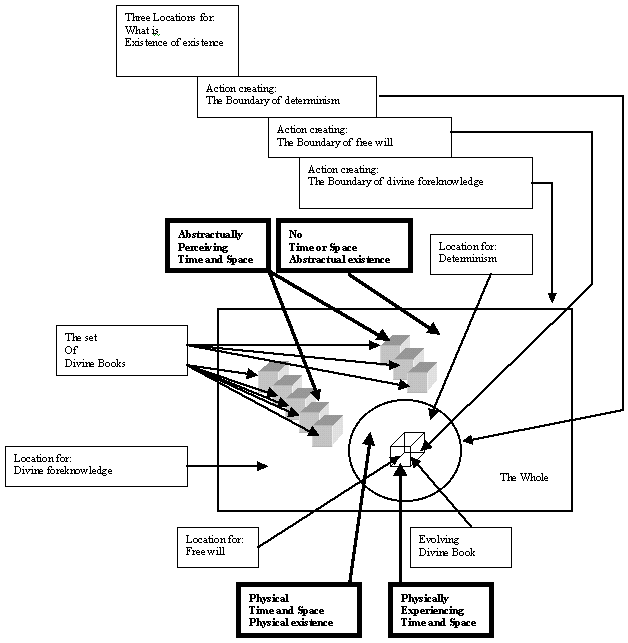|
 
 
Tractate 3 : The Error of Boethius (continued)
Locations for actions:
Four questions arise with the establishment of forms of action:
There are four forms of action:
a. The state of being: a form of passive action
b. Actions bound by the laws of nature: a form of passive action
c. Actions bound by the laws of free will: a form of active action
d. Actions bound by the laws of determinism: a form of active action
The question: Why?
Why the need for a location of action bound by the laws of being?
Why the need for a location of action bound by the laws of nature?
Why the need for a location of action bound by the laws of free will?
Why the need for a location of action bound by the laws of determinism?
The short answers:
What is is

In order to expand our understanding regarding all this back and forth in terms of perceptual understanding, perhaps it would be beneficial to examine the concepts of divine foreknowledge, pre-destination, predestination, and determinism in a little more detail.
Divine foreknowledge, pre-destination, predestination, and determinism versus free will:
Having touched upon the concepts free will, divine foreknowledge, pre-destination, and predestination it may help, before we move on with attempting to further resolve Boethius’ paradox, to examine the four more closely as regards present day perceptions versus a new perception.
Divine foreknowledge:
The concept of divine foreknowledge suggests an awareness of all there was and all there is. The question arises does divine foreknowledge imply an awareness of all that will be. The very name ‘fore’knowledge suggests that to be the case but is it necessarily the case?
Present day perceptions:

Within such a system, there is only one possible conclusion to the question: Does divine ‘fore’knowledge imply not only an awareness of what was and what is but an awareness of what will be?
Since the location of all knowledge is ‘contained’ ‘within #3, entrance of ‘new’ knowing unknown to an omniscient location would suggest the omniscient location is in fact a location without omniscience. The conclusion: Location #3, being omniscient, has no option but to have knowledge of what will be.
This perception is rational yet unexplainable when examined in the face of free will being free will. Thus Boethius’ statement:
…’Therefore, all those things which happen without happening of necessity are, before they happen, future events about to happen, but not about to happen of necessity. For just as the knowledge of present things imposes no necessity on what is happening, so foreknowledge imposes no necessity on what is going to happen.
‘The cause of this mistake is that people think that the totality of their knowledge depends on the nature and capacity to be known of the objects of knowledge. But this is all wrong.’…
‘The point of greatest importance here is this: the superior manner of knowledge includes the inferior, but it is quite impossible for the inferior to rise to the superior.’…
‘In the same way, human reason refuses to believe that divine intelligence can see the future in any other way except that in which human reason has knowledge.’…
becomes the rationale as to why this is so. Our lack of understanding is due to our limited perception relative to the Whole itself. We perceive the Whole as being what is found ‘within’ physical reality, within our universe.
Can such an argument be circumvented? A modification of our present perception through the simple process of shifting the location of the physical reality from being placed within a void into being placed within a region of abstraction will resolve the issue. The perceptual development of an abstractual region not only eliminates the questionable region of a void, region #2, existing ‘outside’ of regions #1 and #3 and thus simplifies the perception but the process of shifting the physical into existing ‘within’ the abstractual simplifies the repercussions regarding the concept of ‘death’ itself. Interestingly enough, the concept of ‘death’ does not just apply to unique entities of ‘knowing’ found ‘within’ the universe but applies to the unique entities of ‘knowing’ found ‘within’ the abstract should the universe itself ‘die’.
But why wouldn’t the abstract shift into the physical as opposed to the physical shifting into the abstract? This discussion took place within Tractate 1: Zeno and Seamlessness.
Let’s look in more detail at what we are suggesting.
The new perception:

Within such a system, there is a new possibility regarding the question: Does divine ‘fore’knowledge imply not only an awareness of what was and what is but an awareness of what will be?
Within such a system, since the location of all knowledge is ‘contained’ ‘within’ #3, entrance of ‘new’ unknown knowing into an omniscient location would not require entrance for it would already be ‘within’. As such, the concept of what will be would be a part of what is and thus becomes a form of what is versus what will be.
However, wouldn’t the entrance of unique entities of ‘knowing’ into #3 imply either a level of cardinality, an order of consecutiveness, or both? If we reexamine the diagram using a little more detail, we begin to find answers to just such questions regarding levels of cardinality and orders of consecutiveness.

Such a perception does more than provide a symmetrical orientation to the perception we have of what we call our universe, what we call reality.
Such a perception explains how it is possible to gain an entrance of ‘newness’, an entrance of what ‘will be’ into what ‘is’ without our present understanding of ‘newness’ following ‘oldness’, without the need of our present understanding of consecutive order and our present understanding of ‘levels’ of cardinality in terms of individual significance.
When ‘newness’, what ‘will be’, enters region #3, ‘newness’ carries with it an understanding of time and distance but enters a region lacking time and distance. As such, independent packets of knowing have no relative primal order upon which they depend once within region #3.
The same concept applies to relative concepts of ‘worth’. This concept will be examined in detail within Tractate 4: Copernicus. In the mean time, let us return to the concept of ‘free will’ becoming simply a state of what ‘is’ within such system and thus the concept of what ‘will be’ no longer becomes an issue for region #3. The result: The concept, divine foreknowledge, becomes a possibility for region #3 while simultaneously being a non-issue for region #1.
This process is best described as a process of separation through inclusion as opposed to separation through exclusion. This concept is described in detail in Tractate 8: Russell. Although the process of separation through inclusion best describes the system, Tractate 4: Copernicus lays the foundation to understanding such a concept through its dialectic regarding centricisn versus non-centricism.
The new perception initiates an understanding regarding how it is ‘free will’ could exist simultaneously with ‘divine foreknowledge’. This in turn allows us to discard Boethius’ premise that humanity is capable of perceiving paradoxes including some of which humanity is incapable of resolving.
Thus, Boethius’ statement:
…’Therefore, all those things which happen without happening of necessity are, before they happen, future events about to happen, but not about to happen of necessity. For just as the knowledge of present things imposes no necessity on what is happening, so foreknowledge imposes no necessity on what is going to happen.
‘The cause of this mistake is that people think that the totality of their knowledge depends on the nature and capacity to be known of the objects of knowledge. But this is all wrong.’…
‘The point of greatest importance here is this: the superior manner of knowledge includes the inferior, but it is quite impossible for the inferior to rise to the superior.’…
‘In the same way, human reason refuses to believe that divine intelligence can see the future in any other way except that in which human reason has knowledge.’…
is on the brink of finally being able to be discarded, at least for the time being. Interestingly enough, while we may be able to discard Boethius’ concept regarding the limitedness of entities of ‘knowing’ we are able to retain Boethius’ concepts regarding the simultaneous existence of ‘free will’ and ‘divine foreknowledge’.
So much for ‘divine foreknowledge’, but what of pre-destination?
Pre-destination:
Pre-destination is the concept of individual entities of ‘knowing’ having a variety of locations to which the individual entities of ‘knowing’ can ‘go’. In the case of pre-destination it would better be said: Pre-destination is the concept of individual entities of ‘knowing’ having pre-assigned locations to which they are sent irrespective of the desire of the individual entity of ‘knowing’, irrespective of the desire of any parts of the whole, and irrespective of the desire of the whole itself. Pre-destination applies to the situation where the entities of ‘knowing’ becoming separated from the physical should such a separation be possible.
Present day perceptions:

Within such a system, there are three possibilities: We are ‘pre-destined’ to enter one of three locations:
- Upon death we may enter the universe. However since the universe is immersed ‘within’ time, since time is an apparent innate characteristic of a matter/energy system, then when time ends abstractual knowing has two possibilities
- Upon death of the universe or before the death of the universe, abstractual knowing will enter either #2 or #3. If abstractual knowing enters #2 then abstractual knowing is alone, perhaps forever, fear enters the picture.
- Upon death of the universe or before death of the universe, abstractual knowing will enter either #2 or #3. If abstractual knowing enters #3 then abstractual knowing no longer remains isolated, fear exits the picture
The criteria for entering #3: ‘behavior’ as pre-defined by ‘men’ or ‘God’.
The new perception:

Two possibilities: We are ‘pre-destined’ to enter one of two ‘locations’
- Upon death, we may enter the universe. However since the universe is immersed ‘withn’ time, since time is an apparent innate characteristic of a matter/energy system, then when time ends abstractual knowing has one possibility:
- Upon death of the universe or before death of the universe, abstractual knowing will enter #3. If abstractual knowing enters #3 then abstractual knowing remains but no longer remains isolated, fear exists the picture
The criteria for entering #3: There is no criterion for entering #3, for there is no other possibility.
The implication is that pre-destination no longer becomes a pre-destined destination but rather the location is singular. Only one location exists although that location may be subdivided into various distinct perceptual subsets. The result of a perception of singularity: the elimination of the need to ‘enter’. One is already ‘in’ the location of one’s desired final destination.
If pre-destination no longer becomes pre-destined in the sense that a choice of one of several destinations is ‘made’ or is ‘assigned for one’s self by a second party other than one’s self, what then of predestination?
The concept of pre-destination becoming obsolete is not the only resultant obsolescence the new perception, singularity of location, creates.
Predestination:
Present day perceptions:
Predestination: The doctrine that man’s salvation or damnation was predetermined from eternity by God. When the doctrine holds that not only man’s eventual disposition but every event of his life is predestined, the position is identical to a special kind of determinism. (Dictionary of Philosophy and Religion, William L. Reese, 1980.)
Under an Aristotelian system, predestination suggests the ‘divine book’ has already been written. Predestination suggests, although one may not ‘know’ of one’s future, the reader, the author, or both can certainly look ahead and discover what is to happen to the participants, the characters, ‘within’ the book. This concept, however, eludes the characters found within the ‘divine book’.
The ‘degree of action’, possessed by the characters found within ‘the divine book’, separates predestination from various types and degrees of determinism.
Regardless of the degree of separation, however, all forms of predestination and determinism embrace the concept of ‘a’ ‘divine book’. One form of ‘divine book’ may be more interactive than another but they all have ‘an’ ending.
The new perception:
Within a perceptual system of singularity subdivided into subsets, time and distance are not what complete individual entities of ‘knowing’, entities of individuality; find themselves immersed ‘within’. Rather completed entities of ‘knowing find time and distance immersed ‘within’ themselves. Time and distance find themselves immersed ‘within’ completed units of ‘knowing’.
On the other hand, it is the ‘forming’, the ‘evolving’, ‘incomplete’ units of ‘knowing’ which find themselves immersed ‘within’ time and distance.
The perception of the whole system creates a new understanding as to the ‘meaning’ of predestination.
Before examining the new perception regarding predestination, let’s reexamine the new perception regarding singularity of location. We will begin such an examination with a familiar diagram. The diagram is slightly different, however, from what we examined previously. In this diagram, the specific regions within which time and space can be found are identified. When examining such regions, do not overlook the significance regarding the difference between physically experiencing time and space versus abstractually perceiving time and space.

So what does this do to the concept of ‘predestination’?
This perception moves predestination from being:
Predestination: The doctrine that man’s salvation or damnation was predetermined from eternity by God. When the doctrine holds that not only man’s eventual disposition but every event of his life is predestined, the position is identical to a special kind of determinism. (Dictionary of Philosophy and Religion, William L. Reese, 1980.)
To being:
Predestination would now suggest the ‘divine book’ has not ‘been’ written but ‘is being’ written. Predestination suggests, although one may not ‘know’ of one’s future, neither does the reader, neither does the author know of one’s future for the future has not yet been written for the ‘book’ is written but on the other hand the ‘book’ is ever evolving within a ‘location’ of timelessness.
Predestination would now suggest absolutely NO entity can look ahead and discover what ‘is to happen’ to the participants, the characters ‘within’ the book. The concept of ‘knowing’ how the story ends eludes all entities of the system including the entity of the ‘whole’ system itself.
How can this be? The inability to understand the ‘end’ of the story becomes a characteristic of the system for the concept of time is not ‘a’ universal factor of the whole but rather time simply finds itself as ‘an’ aspect of subsets of the whole rather than being ‘a’ universal characteristic of the whole.
As such, the ‘divine book’ appropriately becomes the epitome of the lesser known children’s novel: ‘The Never Ending Story’. And just why would such a perception be ‘appropriate’? It becomes appropriate for it moves us into understanding that we are not a subset of a ‘static’ ‘whole’ but rather we are a subset of a ‘dynamic’ whole and as such we do not have just a journey of exciting discover awaiting us but rather we have an ‘endless’ exciting journey of discover. Within such a perception, we will never run out of ‘new’ exciting experiences and fascinating previously unknown knowledge for ‘newness’ itself becomes an innate characteristic of the ‘whole’. Such a perception represents the fountain of youth for our specie, for how can one ever grow old when presented with an endless emergence of new frontiers to placate our unquenchable thirst for new knowledge.
This new perception suggests the only form of ‘predestination’ lies in the concept of change itself. This new perception suggests we, as individuals and as a specie, are a part of this thing called ‘eternal change’ in a much greater degree than we have every previously conceived.
Within the new perception, although predestination and determinism embrace the concept of ‘a’ ‘divine book’, they embrace it as a ‘Never Ending Story’ for the ‘divine book’ no longer has ‘an’ ending.
How does this new perception affect the concept of determinism? Does determinism remain simply an extreme form of predestination, as we presently perceive it to be?
|
|
|










